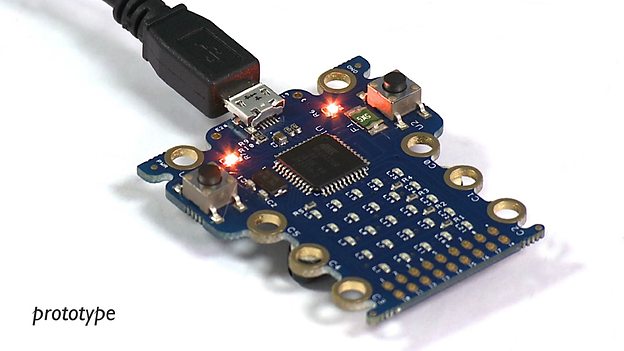In a move that will bring a nostalgic smile to some British kids (and teachers) of the 80s, the BBC has announced that it is to produce a new educational mini-computer — codenamed the ‘Micro Bit’, a play on the broadcaster’s original ‘BBC Micro‘ computer — and will give away 1 million devices to British school kids aged 11. It will be distributed nationwide from autumn 2015.
The new hardware project is part of the BBC’s wider ‘Make it Digital’ initiative to inspire “a new generation to get creative with coding, programming and digital technology,” as the UK attempts to fill an anticipated ‘skills gap’ in the country’s growing digital economy.
The move, which sees the BBC partner with over 25 organisations to develop the Micro Bit, including chip-makers ARM and Nordic Semiconductor, Microsoft, and Samsung, is also interesting in that it seems determined to address issues that caused controversy when the original BBC Micro was released.
The 1980s personal computer was too expensive to truly democrotise computer programming, often seeing only a handful of devices purchased by each school. In fact, I’m old enough to remember how scarce time on the BBC Micro was — it sometimes felt like time-share computing, mainframe-style — and, as the son of a school teacher, I was lucky enough to borrow a BBC Micro during the school holidays, even if all I mostly did was play Chuckie Egg. But I digress…
The other issue with the original BBC Micro was that, despite involving a tendering process that saw multiple computer-makers bid to produce the device, the broadcaster’s decision to partner with Acorn Computing angered competitors, particularly the ZX Spectrum founder Sir Clive Sinclair. Why did the BBC need to produce a personal computer of its own when there were already similar devices coming to market?
At first glance, the same could be said of the Micro Bit. However, the PR related to the device is keen to pitch the hardware as a ‘gateway drug’ to more sophisticated educational and hobby computing, such as Arduino and Raspberry Pi. The latter has sold over 5 million units after all.
The Micro Bit will be a small, wearable device with an LED display that children can programme in a number of ways. It will be a standalone, entry-level coding device that allows children to pick it up, plug it into a computer and start creating with it immediately.
It is designed to be a starting point to get younger children interesting in coding so they can move onto other, more complex devices in future. And the Micro Bit can even connect and communicate with these other devices, including Arduino, Galileo, Kano and Raspberry Pi, as well as other Micro Bits. This helps a child’s natural learning progression and gives them even more ways of expressing their creativity.
The BBC News (yes, the BBC reporting on itself) also notes that the production of the Micro Bit will be a one-off. Once those 1 million units have been produced and distributed to 11 year-old British school children this autumn, there will be no more.
If true, we can only presume this is another move designed to appease the private sector and not repeat the mistakes of the original BBC Micro project. A few years ago I sat in on a private meeting between commercial broadcasters and others in the digital learning space, and the BBC was enemy number one. And that’s putting it mildly.
BBC Learning’s Gareth Stockdale is quoted by BBC News as saying: “The BBC’s role is to bring focus to the issue, and then we will withdraw from the market.”
However, with a ton of learning material and content being thrown at the Micro Bit by the British taxpayer-funded BBC and in partnership with those 25+ other organisations, I can’t help feeling it will be a waste of money to can the hardware side of the project after just one year. Of course, startups and others in the educational computing space (such as the soon-to-launch PI Top) will likely disagree.































Comment